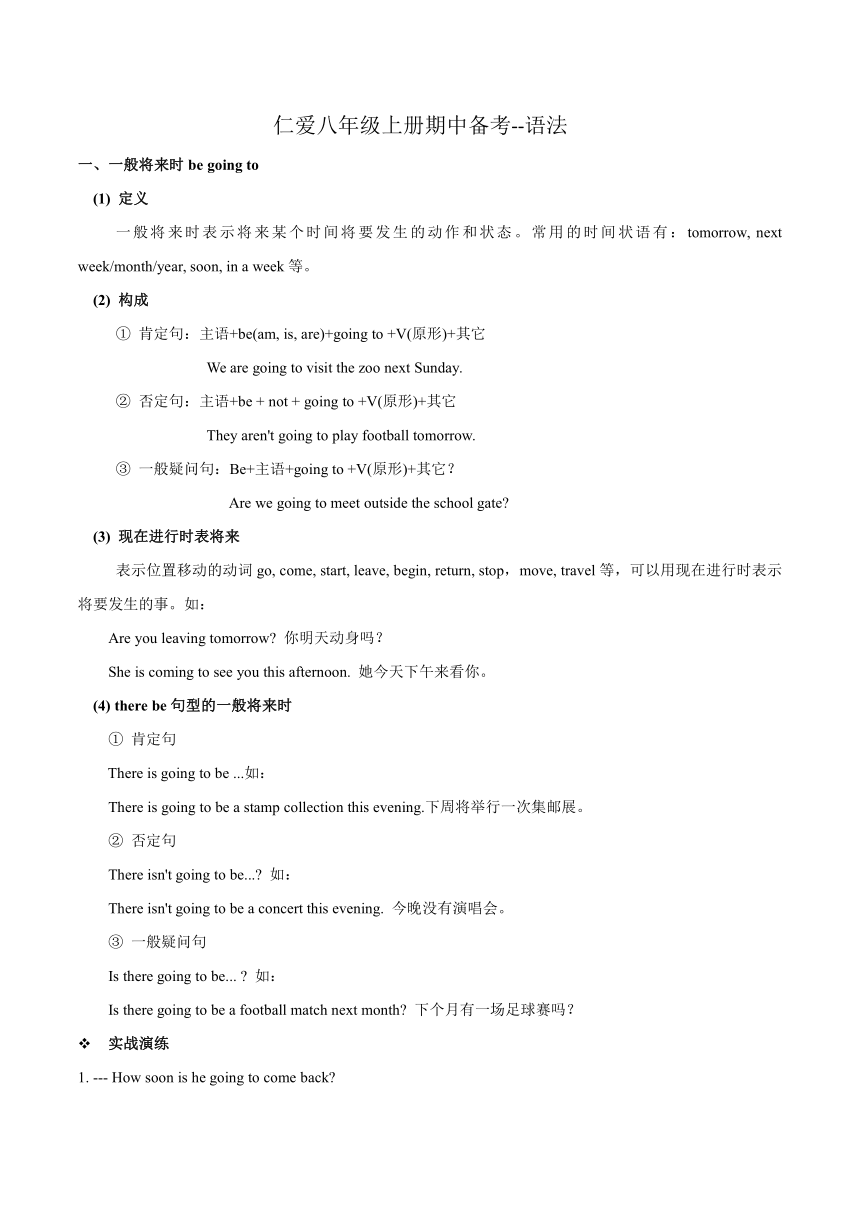
仁爱八年级上册期中备考--语法 一、一般将来时be going to (1) 定义 一般将来时表示将来某个时间将要发生的动作和状态。常用的时间状语有:tomorrow, next week/month/year, soon, in a week等。 (2) 构成 ① 肯定句:主语+be(am, is, are)+going to +V(原形)+其它 We are going to visit the zoo next Sunday. ② 否定句:主语+be + not + going to +V(原形)+其它 They aren't going to play football tomorrow. ③ 一般疑问句:Be+主语+going to +V(原形)+其它? Are we going to meet outside the school gate? (3) 现在进行时表将来 表示位置移动的动词go, come, start, leave, begin, return, stop,move, travel等,可以用现在进行时表示将要发生的事。如: Are you leaving tomorrow? 你明天动身吗? She is coming to see you this afternoon. 她今天下午来看你。 (4) there be句型的一般将来时 ① 肯定句 There is going to be ...如: There is going to be a stamp collection this evening.下周将举行一次集邮展。 ② 否定句 There isn't going to be...? 如: There isn't going to be a concert this evening. 今晚没有演唱会。 ③ 一般疑问句 Is there going to be... ? 如: Is there going to be a football match next month? 下个月有一场足球赛吗? 实战演练 1. -- How soon is he going to come back? -- _____ about three days. A. For B. After C. In D. During 2. -- Jane, hurry up! It's time to leave. -- OK. _____ A. I come B. I've come C. I'm coming D. I comes 3. Attention, please. There _____ a football game between China and Korea this evening. A. is going to be B. has been C. has D. is going to have 4. The Browns _____ to Beijing next week. A. is going B. are going to go C. are go D. is going to go 5. There _____ a meeting tomorrow afternoon. A. be going to B. are going to be C. is going to be D. go to be 1-5 CCABC 二、动词双宾语 定义:某些及物动词的后面可以接两次属性不同的宾语, 一个是“人”,为间接宾语,一个是“物”,为直接宾语,两者合称为双宾语。 结构:V. + sb. + sth. = V. + sth. to(for) sb. 例如:His mother bought him a pair of shoes. = His mother bought a pair of shoes for him. He teaches us English. = He teaches English to us. He told us a very interesting story. = He told a very interesting story to us. 注意: 后接to的常有:bring, give, lend, offer, pass, sell, send, show, tell, throw, write 后接for的常有:make, get, buy, sing, book, build, choose, cook, keep, order (用to侧重动作的方向,表示朝着、向着、对着某人;用for侧重动作的受益者,表示为了某人、替某人。) (一) 1. You must bring me your homework tomorrow. You must _____ your homework _____ me tomorrow. 2. Please buy something for me to drink. Please _____ _____ something to drink. 3. Kate _____ English and I _____ Chinese. A. teaches us, teach she B. teaches we, teach she C. teaches us, teach her D. teaches our, teach her 4. This is my new book. Let me _____. A. to show you it B. show it to you C. show it you D. to show it to you 1. taught us 2. cooked for 3-5 A C C 三、一般将来时构成 will/shall+do (1) 定义 一般将来时表示将来某个时间将要发生的动作和状态。常用的时间状语有:tomorrow, next week/month/year, soon, in a week等。 (2) 构成 ① 肯定句:I/We/You/He/She/It/Th ... ...
~~ 您好,已阅读到文档的结尾了 ~~

